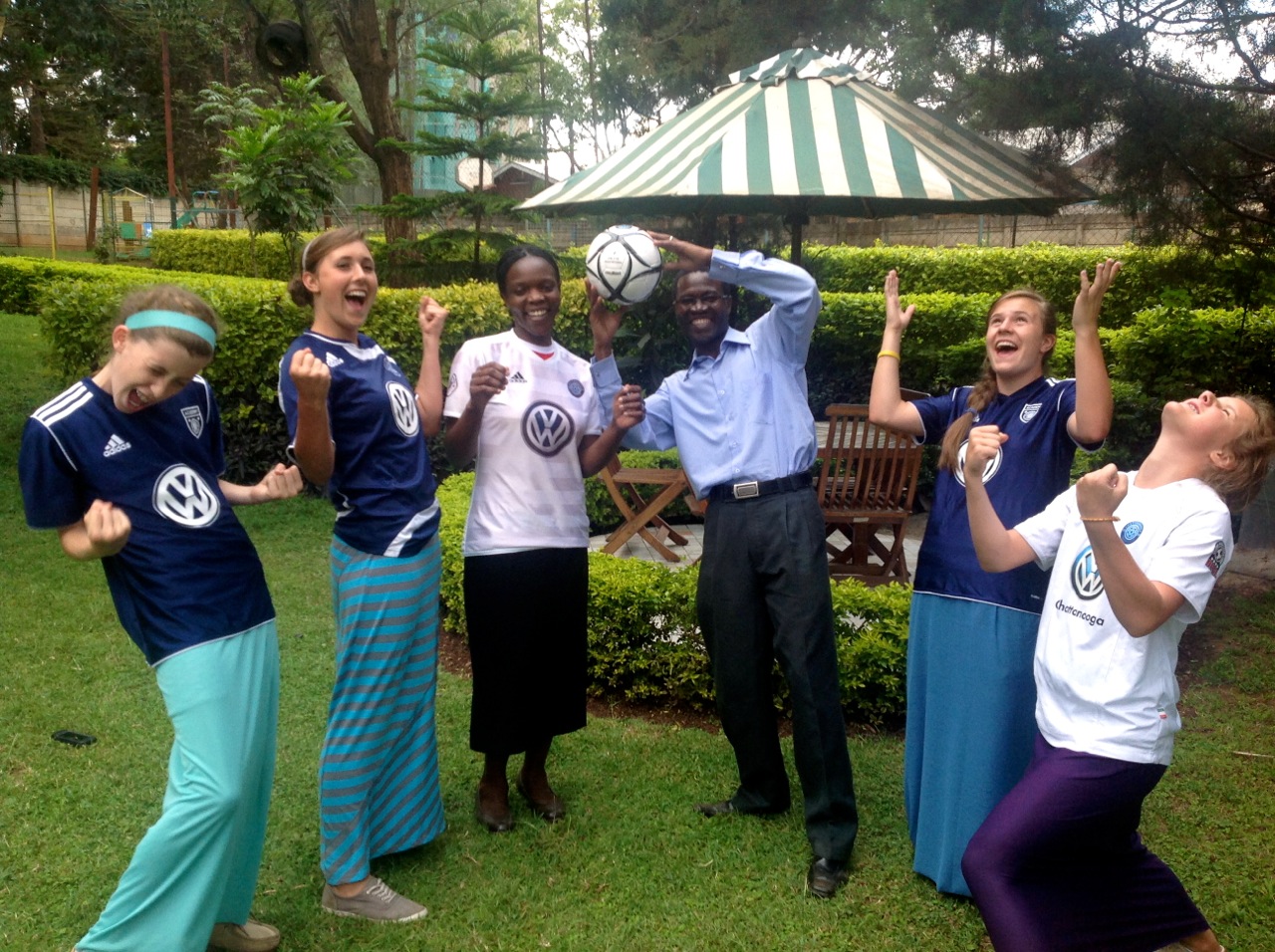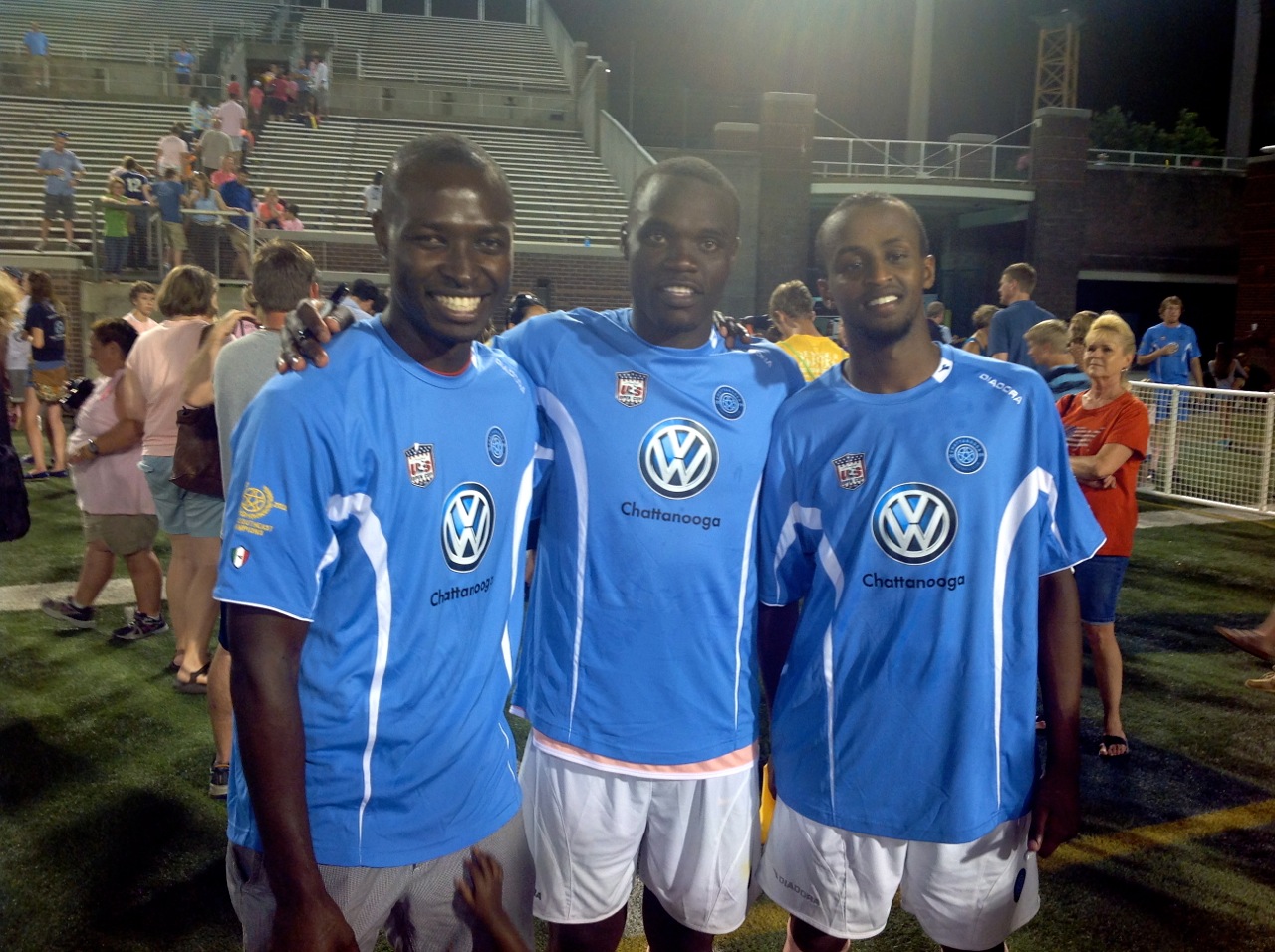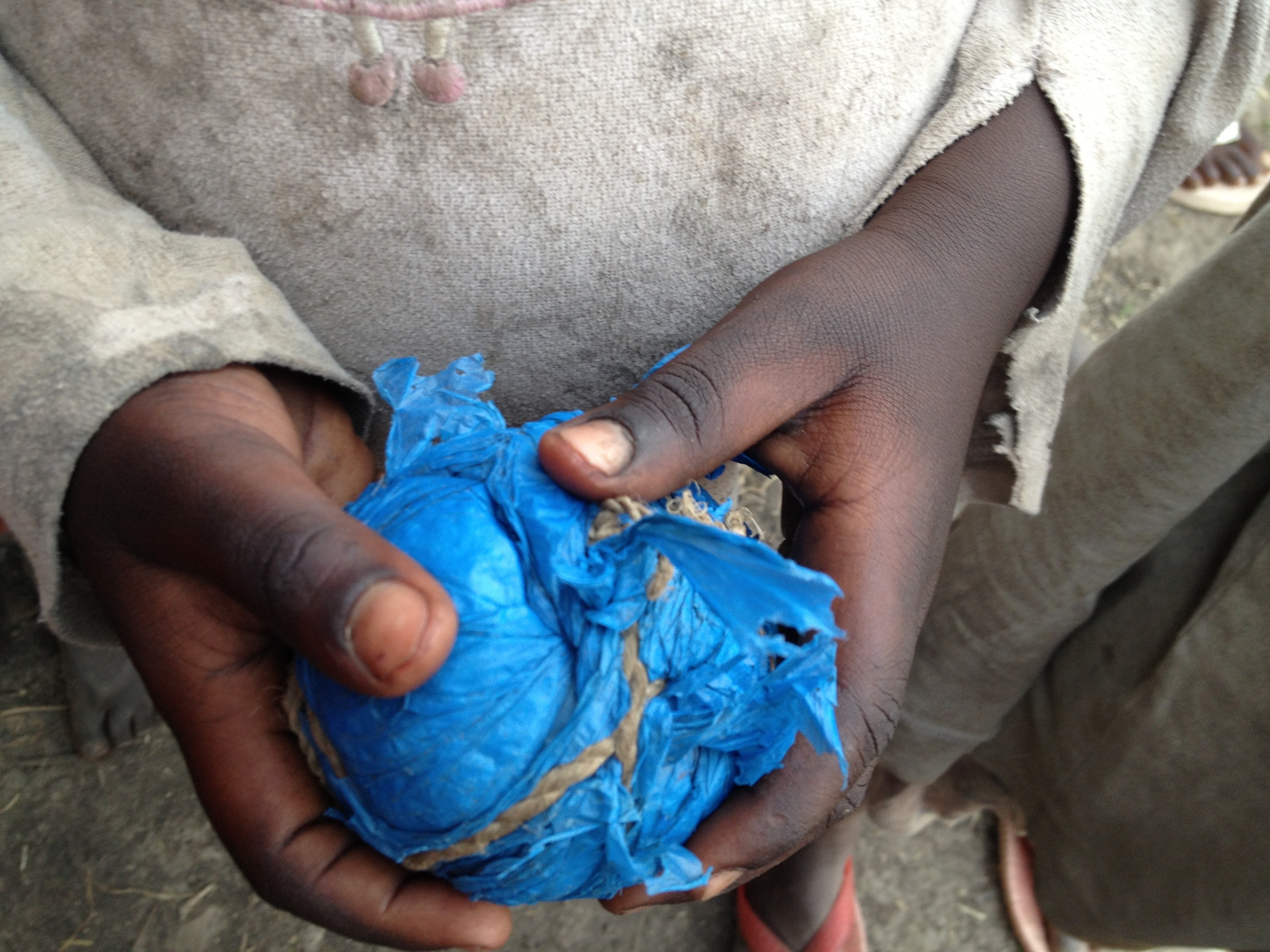For the rabid, chant-yelling, drum-beating Chattahooligans and other devout fans of the Chattanooga Football Club, warm Saturday evenings are best spent at Finley Stadium, cheering on the team of amateur soccer players outfitted in the team's blue and white striped jerseys, soccer shorts and leather cleats with sharp spikes that pierce the field's soft grass as feet fight for the chance to strike the spinning football.
For many young Kenyans, warm Sunday afternoons are best spent on whatever field that they can find. There are no lights or fans as calloused feet shod in flip-flops or not at all, strike at balls bound with agave-based sisal fiber or tape wound around plastic shopping bags and mattress fillers. The field might contain hazards of grazing goats and their droppings, or broken glass and blade-edged stones sharp enough to slice.
But for these few moments, unprotected feet and players forget the smelling and stinging reminders of poverty and stir the dust as they sprint after the roundish object.
On soccer fields like these in Nairobi, Chattanooga Football Club players Chris Ochieng, Mohamed Aden and Nixson Odeny learned the skills and life lessons that soccer teaches. Those skills led the CFC to advance through two rounds of the National Premier Soccer League South Conference playoffs, but they eventually lost 1-0 in the championship game against the RVA Football Club from Richmond, Va..
A few weekends ago, a few time zones and many worlds away, the family of CFC founder Krue Brock were in Nairobi, worked with children in the slums of Kibera in a classroom. The only light was a dim shaft of sunlight that stubbornly wedged its way through a window in the red clay wall of a shanty hut.
Hollee Brock, Krue's wife, their daughter, 14-year-old Eden, and several nieces took the afternoon to host the families and friends of the Kenyan players for a tea of boxed apple juice and English biscuits, all the accoutrements that could be found in the hostel where they were staying.
While at the tea, Hollee received a phone call from her husband, who called to let her know that CFC had won the National Premier Soccer League Southeast Division title, the first step in their road to the conference championship. With the news, the Chattanooga family had more than greetings and gifts for the families of the Kenyan players, they had great news.
For the Brocks, whose love of soccer matches their love of community, moments like the tea in Kenya are just another way to build relationships, even if the relationships and the community span cultures and continents. Seeing where the Kenyan players had come from and the odds they faced gave the Brocks a new appreciation for the unifying power of the sport and the determination of the Kenyan players.
"To see their families' pride in them and to have context for what these particular players have come from and that they are now in Chattanooga and are a huge part of team, it just makes it even more rich," the 44-year-old Hollee says. "Yes, I will watch them differently. I will watch them play and will be like, 'I know your sister! I know your brother!'"
"Profound" is the word Krue uses to describe the connections that his wife and family made while in Africa.
"For [Hollee and Eden] to work in the most difficult slums to build relationships and help as they could and make the connection with the three Kenyan Chattanooga FC players' families in Nairobi is profound," Krue says.
Cross-continental messages
While at the tea in Nairobi, the three soft-spoken sisters of CFC player Mohamed Aden smiled through traditional Somali head scarves woven in cobalt blue, leopard print and coral. They demurely murmured their video message to their brother in Tennessee.
"We wish you all the best," they said, "You guys are doing a great job."
The outspoken family of CFC player Chris Ochieng had attended church that morning and everyone except his brothers, who wore the soccer jerseys of their Kenyan teams, were dressed in their Sunday best.
"Kudos to all of you!" they said.
For the Brock girls, who also play and love soccer, meeting the families of the Kenyan CFC players showed them that language of sports can be universal.
"I had just met the players and then coming here and meeting the families ... It all just came together through soccer," says Marshall Rustand, 17-year-old niece of Hollee and Krue and daughter of Marshall Rustand, another CFC co-founder. "We all have this common language even though we did not speak the same language."
In Kenya where sharp differences can sometime divide the community along tribal or economic lines, soccer is the great equalizer.
"We went to a clinic on a Saturday morning," says Zoe Rustand, 15. "Most of them were either from the slums or they had, like, the jersey and the cleats. But when we got on the field, like everybody was equal."
Meeting the Kenyan families not only deepened the Brocks' understanding and affection for the CFC's Kenyan players, it deepened the affection the Kenyan players feel for the team and its leaders.
"My sisters told me about their encounter with Hollee and they are always happy when her name comes up," says Aden, "Bu it's not a surprise because her husband Krue and her sons are individuals that I enjoy. I am fortunate to have them."
For Ochieng, Hollee's visit to his family reminded him of the impact that Chattanoogans have had on the midfielder.
"Hollee's visit to my family tells me [of] the kind of reception I got the first time I landed in Chattanooga," he says. "And I'll be forever grateful for what she and the Chattanooga Football Club has done for me."
Ochieng grew up in Nairobi where he had to be creative when it came to finding and keeping soccer balls - known as footballs in most of the rest of the world.
"We had to make our own balls using polythene bags. The moments I won't forget is how stubborn we were with our polythene balls," he says. "We were breaking house windows while playing since we didn't get to use the field as much as we wanted, so we used to play behind the houses. We used to have our balls confiscated or burnt, but we decided that each one of us should make their own ball so we never had to wait after losing a ball."
Losing a ball was just one of Ochieng's challenges.
"Eastlands was an area where crime and alcoholism amongst youth was rampant, but playing football took me away from the pressure," Ochieng says, "It kept me busy and I lacked time to be tempted to be involved in such activities."
Aden's challenges were a little different.
"Coming from a family that did not encourage playing sports but instead focused more on academics [was a challenge]," he says. "Apart from that, there were the other challenges that most developing countries' kids go through, and they are vast."
Their fellow CFC players have learned from the Kenyans as well.
"They've taught me that no matter where you are from, whether its Kenya or Tennessee, that soccer is just our link between like-minded people who are pursuing their passion," says CFC's 26-year-old center, Michael Brooks Jr.


